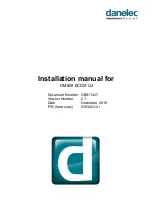
Alarms
WARNING
If
Alarm Setup
>
Audible & Visual
>
Pause All Audio for 5 min
or the 2 minute audio pause is selected before an alarm is
triggered, only the alarms for hypoxic gas mixture (
FiO2 low
,
EtO2 low
,
FiN2O high
), and the alarm for dangerously high
airway pressure (
Ppeak high
: measured Ppeak exceeds the
set high alarm limit by 10 cmH
2
O) will break through. The
pause audio behavior is configured in the
Care Unit Settings
and the setting is password protected.
WARNING
When connecting PDM or TRAM, the loaded IP labels may
affect the channel labeling of other already connected
channels, and consequently also the alarm limits.
WARNING
B650, B450: Secondary displays do not sound audible alarms.
Keep the patient under close surveillance.
WARNING
B850: Using other displays than the B850 system specific ones
may result in loss of visual alarms and patient monitoring.
WARNING
Do not connect a monochrome display to the monitor. Visual
alarm indicators may not appear properly.
Alarm cautions
CAUTION
Reducing the physiological alarms’ priority levels lower than
the default level can lead to missed detection of serious
events and therefore to adverse patient outcome. If you
adjust the priority levels for non-lethal arrhythmias, FiCO
2
and/or EtCO
2
alarms lower than the default value, keep the
patient under close surveillance.
Alarm overview
Alarm types
The monitor provides two types of alarm settings, system and patient-specific. System
alarm settings are set globally across an entire care environment. They are configured
at the time of installation and are password protected. Examples of configurable
system alarm settings are:
●
Minimum alarm volume allowed
●
Audio and alarm light off allowed
●
Absolute (Guard) limit setting
Patient-specific alarm settings are individualized, based on a patient’s current
condition. Examples of bedside alarm settings are:
●
Parameter alarm limits
●
Arrhythmia alarm priority settings
Alarm conditions
●
Physiological alarm conditions are triggered by a patient measurement being
outside the parameter limits, by apnea, or by an arrhythmia condition.
2062971-001
CARESCAPE Modular Monitors
129
Summary of Contents for CARESCAPE
Page 38: ...38 CARESCAPE Modular Monitors 2062971 001 ...
Page 114: ...Setting up the monitor before use 114 CARESCAPE Modular Monitors 2062971 001 ...
Page 146: ...Alarms 146 CARESCAPE Modular Monitors 2062971 001 ...
Page 218: ...Pulse oximetry 218 CARESCAPE Modular Monitors 2062971 001 ...
Page 234: ...Non invasive blood pressure 234 CARESCAPE Modular Monitors 2062971 001 ...
Page 260: ...Temperature 260 CARESCAPE Modular Monitors 2062971 001 ...
Page 274: ...Cardiac output 274 CARESCAPE Modular Monitors 2062971 001 ...
Page 280: ...Mixed venous oxygen saturation SvO 280 CARESCAPE Modular Monitors 2062971 001 ...
Page 338: ...Patient Spirometry 338 CARESCAPE Modular Monitors 2062971 001 ...
Page 372: ...Neuromuscular transmission 372 CARESCAPE Modular Monitors 2062971 001 ...
Page 404: ...Laboratory data 404 CARESCAPE Modular Monitors 2062971 001 ...
Page 410: ...Calculations 410 CARESCAPE Modular Monitors 2062971 001 ...
Page 416: ...Drug calculations 416 CARESCAPE Modular Monitors 2062971 001 ...
Page 424: ...Trends 424 CARESCAPE Modular Monitors 2062971 001 ...
Page 432: ...Snapshots and events 432 CARESCAPE Modular Monitors 2062971 001 ...
Page 462: ...Cleaning and care 462 CARESCAPE Modular Monitors 2062971 001 ...
Page 528: ...Abbreviations yr year yrs years 528 CARESCAPE Modular Monitors 2062971 001 ...
Page 546: ...Skills checklist 546 CARESCAPE Modular Monitors 2062971 001 ...
Page 547: ...content ...
















































